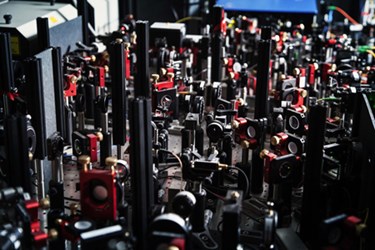Scientists Find Way To Reliably Teleport Data
By Joel Lindsey

Scientists at the Kavli Institute of Nanoscience at the Netherlands’ Delft University of Technology say they have discovered a way to reliably and consistently teleport data between two quantum bits over a distance of up to three meters.
The announcement came as part of a report published recently in the journal Science.
In the experiment, scientists were able to place electrons in a state of “entanglement,” described by a recent New York Times article as a state in which physically separated particles “still appear to remain connected, with the state of one particle instantaneously affecting the state of another.”
The key to the experiment’s success, the researchers said, was the use of extremely cold diamonds as a way of capturing electrons. Once particles became trapped within these diamonds, it became possible to accurately establish and read a particular spin, or value, for electrons. The teleportation device created for the experiments held electrons three meters away from one another, and was able to successfully teleport the spin from one electron to another.
teleportation HD from Hannes Bernien on Vimeo.
Inconsistency has plagued past attempts to teleport quantum information, according to The Times. For example, a teleportation experiment conducted at the University of Maryland in 2009 was able to successfully teleport information between particles only once out of every 100 million attempts, which translated into a rate of one data transfer every 10 minutes or so.
In these most recent teleportation experiments, however, researchers report accurate and instantaneous transfer of information between electrons 100 percent of the time.
Such consistent results could represent a significant advancement in the field of quantum mechanics and could open the way toward the development of an entirely new field of computing.
More specifically, data teleportation could make possible ultra-fast quantum computers capable of solving problems much more quickly than even the most advanced computers currently available. Additionally, a network of quantum computers could provide new forms of privacy, possibly allowing users of quantum computers to perform calculations or tasks in fully secured environments.
After successfully teleporting information between electrons placed three meters away from one another, researchers now plan on trying to extend that distance, a task critical to making data teleportation a useable technology. They plan on attempting to repeat the experiment with particles separated from each other by more than a kilometer.
Image credit: Hanson lab@TUDelft
